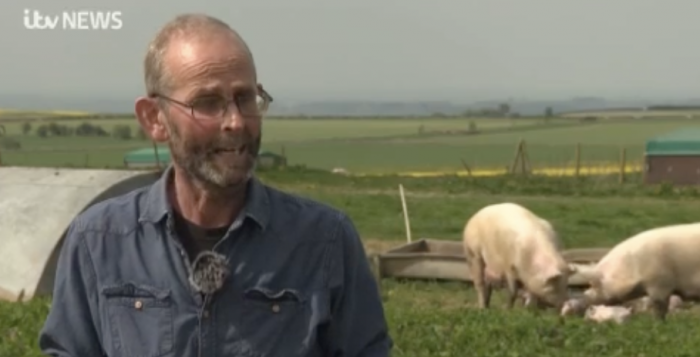Consumers face having high standard UK-produce pork replaced by lower standard imports as the industry crisis continues to take its toll on producers, a Wiltshire farmer has warned.
Following appearances on Channel 4 News and the BBC earlier in the month, Cameron Naughton has highlighted the desperate situation he and other producers are in on ITV West Country News.
Cameron explained how butcher shortages in pork plants continue to create problems on farms, leaving him with 140kg pigs on farm consuming large amounts of vastly expensive feed, but selling for reduced values.
With wheat costs soaring, he estimates that his production costs have soared from 165p/kg late last year to 210p/kg now. Receiving around 170p/kg for his pigs, this equates to weekly losses of around £5,000 every week on his 5,000-pig herd.
Having lived through foot-and-mouth, swine dysentery, bovine TB and other industry crises, he said this was ‘far and away the worst as we have basically been abandoned by the Government and sacrificed on a political point’.
Breeding pig numbers have been cut from 550 to 400 on the 750-acre outdoor farm, and staff from 10 to seven. “It has placed a huge stress on myself, my wife, my staff and my bank manager. We have been able to look after our animals to the best of our ability, but it is costing us a huge amount of money to keep these animals,” he said.
He predicted the crisis could lead to a rapid contraction of the RSPCA-Assured UK pigs, replaced by cheaper imported meat produced to standards illegal in the UK. “I think consumers would be quite shocked to realise the Government was hindering the supply of quality British pigs and allowing imported product at the expense of British production,” he said.
Defra Secretary George Eustice told the programme Defra was addressing issues in the supply chain and particularly contracts that he said ‘aren’t really working fairly’.
“Some of the obligations on pig farmers aren’t reciprocated by corresponding obligations in the other direction and we’re going to use powers under the Agriculture Act to make some changes and have some new statutory requirements for the way those contracts should work to ensure that there is fairer dealing in future,” he said




